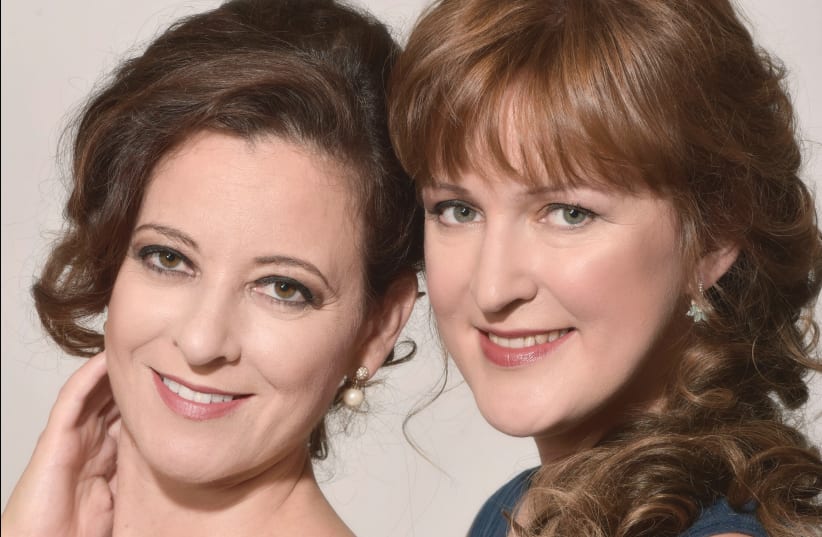Israeli standards adapted to the opera will shine at the focus of A Hebrew Song while The Sopranos – featuring Hila Baggio and Alla Vasilevitsky – will present the audience with a selection of well-loved standards and duets from The Magic Flute, The Tales of Hoffmann and Madame Butterfly. Both productions will be conducted by David Sebba.
Conductor, singer, pianist, acclaimed teacher and a skilled translator of librettos from European languages to Hebrew, Sebba shared some of the challenges of coupling music and poetry with The Jerusalem Post.
“Nathan Alterman is hard to set in music because his poetry doesn’t leave any ‘space’ for the speaker,” he explained. “The system of music and the linguistic system are different. Each has its own gravitational pull. Very often the music, being so powerful, can take over the language in ways which contrast with the spirit of the text.”
When he conducted Goni Cnaani and Anat Czarny in The Argument, a delightful duet that pits an Egyptian princess against a Hebrew beauty in Alterman’s King Solomon and Shalmai the Shoemaker, Sebba makes the complex duet appear as natural as breathing.
He appears in many “One Minute of Opera” online productions in which he takes the audience into the musical tool shed and explains, with grace and simplicity, how the magic is done.
“An opera production is like an aircraft carrier,” he explained. “We’re talking about musicians, singers, costume designers, makeup artists. Productions can take up to a year to open. This is not the same like picking up an accordion.
“In that sense, the Israeli Opera took the brave decision of working, online and with smaller productions, every day of the past year. Other opera houses simply said, ‘No thank you, we know how to do one thing well, and that is high-end opera. We will reopen once we can do that.’ We are looking forward to seeing our 300 audience members during a live performance,” Sebba said.
“I have no doubt they will clap and cheer as if they were an audience of 1,500,” he added. “But two years ago, we would have seen the empty seats and consider it a failure.”
As someone who loves the opera, Sebba is able to point out its funny aspects. In 2008, he created Crazy Opera, during which he lampooned some of the more ridiculous aspects of the genre. For example, that a person can be stabbed and then burst into a long song.
THE OPERA is such a powerful cultural institution that it is often made fun of in popular culture. Examples include the 1935 Marx Brothers’ comedy A Night at the Opera and the 1957 cartoon What’s Opera Doc? which spoofs Wagner, magic helmets, and overblown emotions, among other operatic standards.
“Even this fiction,” Sebba explained, “that a person might be granted time before death to express his feelings, is important. To explore the opera is like taking a stroll in the most wonderful treasure house of humanity. In our opera we have classical productions, current operas, and an ongoing effort to reach younger generations.
“Before COVID-19, we would send two buses to perform all over the country,” he shared. “We would put up productions in local communities based on whatever local theater or music groups they had.”
One such production was the subject of a 2001 documentary If Swissa Does not Come to the Opera. In it, the opera brought Carmen to a southern Tel-Aviv neighborhood.
“Opera is more than a pastime,” he pointed out. “Adaptations are good if they add more substance to the artwork.
“For example, in Mozart’s Così fan tutte the plot requires for the men to make a wager to prove women are unable to be loyal [Alfonso’s bet].
“The original productions had the men speak alone,” he noted, “but modern versions have the women listening in without them knowing. This adds a twist. The women are not being fooled as much as fooling the men. This is very much in step with what we know of Mozart, who was a great admirer of women.”
In addition to Hebrew Song and The Sopranos, the new season offers new productions of The Italian Girl in Algiers, The Elixir of Love, I Capuleti e i Montecchi (Romeo and Juliet) and The Medium. Those eager to explore current operas will enjoy The Mothers by Sebba himself, an opera that explores the often overlooked women of the Bible.
“They were not comets, but flesh and blood,” he remarked. “The next parsha [weekly Torah reading] after the binding of Isaac is the death of Sarah. How did she feel when her son was taken from her to be killed?
“In my opera, Sarah expresses her sorrow in an aria and tells Abraham that he may take Isaac, but he should get ready to bury her in Hebron afterward, because it would be her death.”
The Sopranos will be performed on March 10 and 14 at 8 p.m. and on March 19 at 1 p.m. Tickets range from NIS 180-225. Hebrew Song will be performed on March 11 at 8 p.m. and March 12 at 1 p.m. Tickets range from NIS 150-190. All shows are 90 minutes long without breaks. Only 300 patrons will be admitted providing they can present proof they have recovered from COVID-19 or had taken the vaccine. For more information go to israel-opera.co.il.
